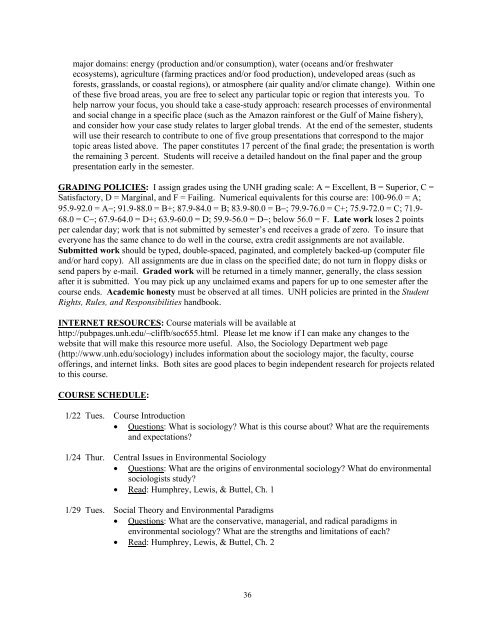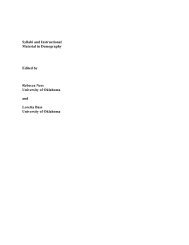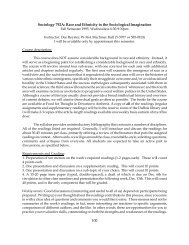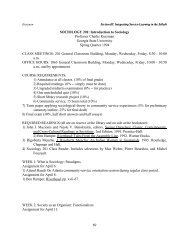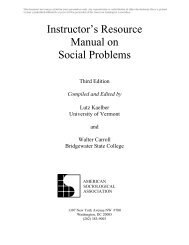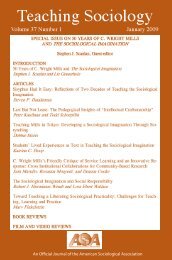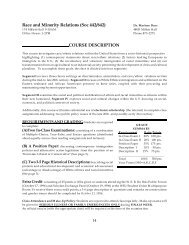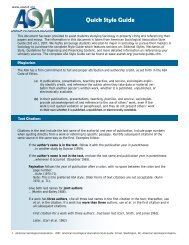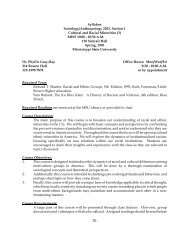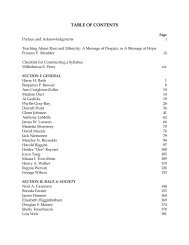Environmental Sociology - American Sociological Association
Environmental Sociology - American Sociological Association
Environmental Sociology - American Sociological Association
You also want an ePaper? Increase the reach of your titles
YUMPU automatically turns print PDFs into web optimized ePapers that Google loves.
major domains: energy (production and/or consumption), water (oceans and/or freshwater<br />
ecosystems), agriculture (farming practices and/or food production), undeveloped areas (such as<br />
forests, grasslands, or coastal regions), or atmosphere (air quality and/or climate change). Within one<br />
of these five broad areas, you are free to select any particular topic or region that interests you. To<br />
help narrow your focus, you should take a case-study approach: research processes of environmental<br />
and social change in a specific place (such as the Amazon rainforest or the Gulf of Maine fishery),<br />
and consider how your case study relates to larger global trends. At the end of the semester, students<br />
will use their research to contribute to one of five group presentations that correspond to the major<br />
topic areas listed above. The paper constitutes 17 percent of the final grade; the presentation is worth<br />
the remaining 3 percent. Students will receive a detailed handout on the final paper and the group<br />
presentation early in the semester.<br />
GRADING POLICIES: I assign grades using the UNH grading scale: A = Excellent, B = Superior, C =<br />
Satisfactory, D = Marginal, and F = Failing. Numerical equivalents for this course are: 100-96.0 = A;<br />
95.9-92.0 = A−; 91.9-88.0 = B+; 87.9-84.0 = B; 83.9-80.0 = B−; 79.9-76.0 = C+; 75.9-72.0 = C; 71.9-<br />
68.0 = C−; 67.9-64.0 = D+; 63.9-60.0 = D; 59.9-56.0 = D−; below 56.0 = F. Late work loses 2 points<br />
per calendar day; work that is not submitted by semester’s end receives a grade of zero. To insure that<br />
everyone has the same chance to do well in the course, extra credit assignments are not available.<br />
Submitted work should be typed, double-spaced, paginated, and completely backed-up (computer file<br />
and/or hard copy). All assignments are due in class on the specified date; do not turn in floppy disks or<br />
send papers by e-mail. Graded work will be returned in a timely manner, generally, the class session<br />
after it is submitted. You may pick up any unclaimed exams and papers for up to one semester after the<br />
course ends. Academic honesty must be observed at all times. UNH policies are printed in the Student<br />
Rights, Rules, and Responsibilities handbook.<br />
INTERNET RESOURCES: Course materials will be available at<br />
http://pubpages.unh.edu/~cliffb/soc655.html. Please let me know if I can make any changes to the<br />
website that will make this resource more useful. Also, the <strong>Sociology</strong> Department web page<br />
(http://www.unh.edu/sociology) includes information about the sociology major, the faculty, course<br />
offerings, and internet links. Both sites are good places to begin independent research for projects related<br />
to this course.<br />
COURSE SCHEDULE:<br />
1/22 Tues. Course Introduction<br />
• Questions: What is sociology? What is this course about? What are the requirements<br />
and expectations?<br />
1/24 Thur. Central Issues in <strong>Environmental</strong> <strong>Sociology</strong><br />
• Questions: What are the origins of environmental sociology? What do environmental<br />
sociologists study?<br />
• Read: Humphrey, Lewis, & Buttel, Ch. 1<br />
1/29 Tues. Social Theory and <strong>Environmental</strong> Paradigms<br />
• Questions: What are the conservative, managerial, and radical paradigms in<br />
environmental sociology? What are the strengths and limitations of each?<br />
• Read: Humphrey, Lewis, & Buttel, Ch. 2<br />
36


